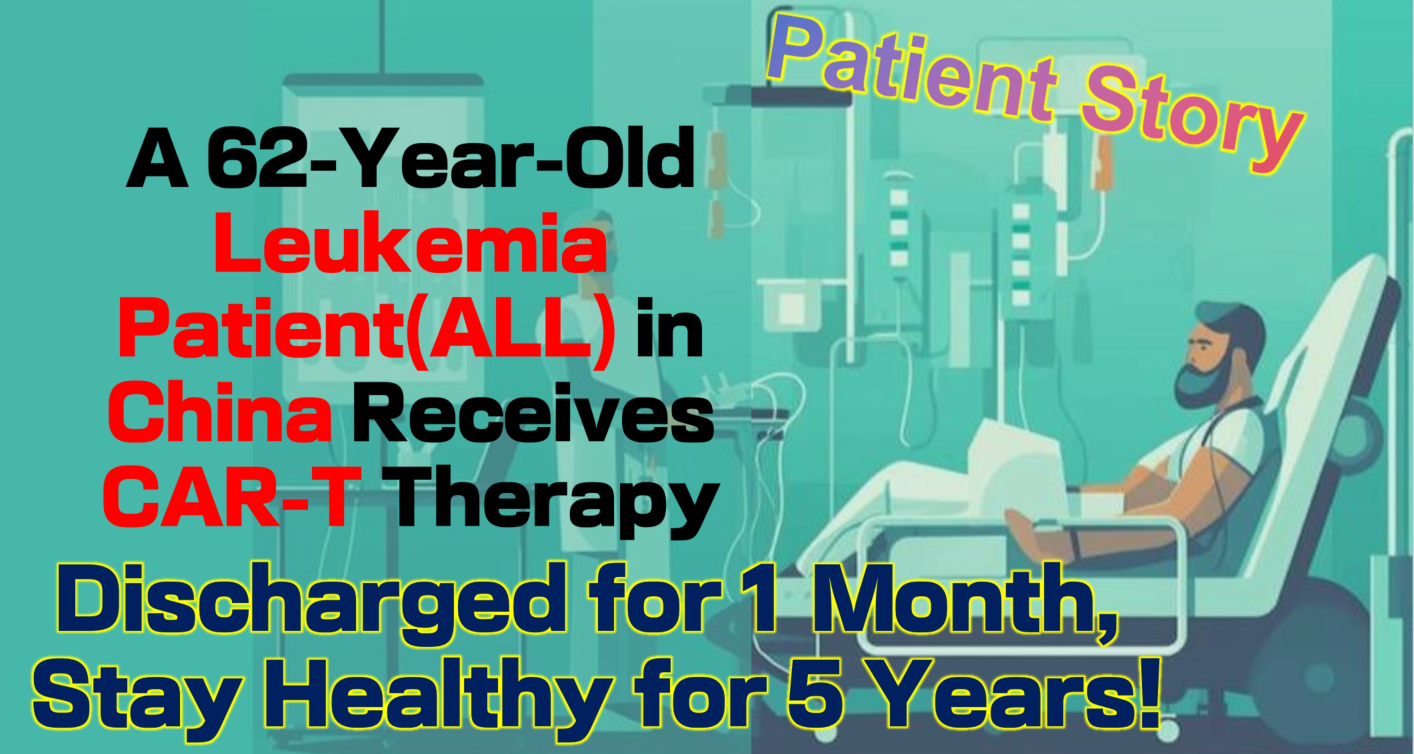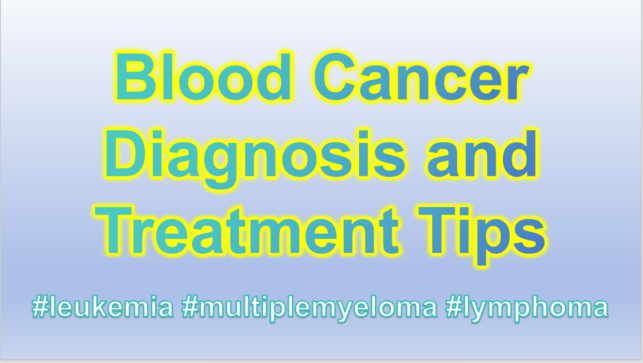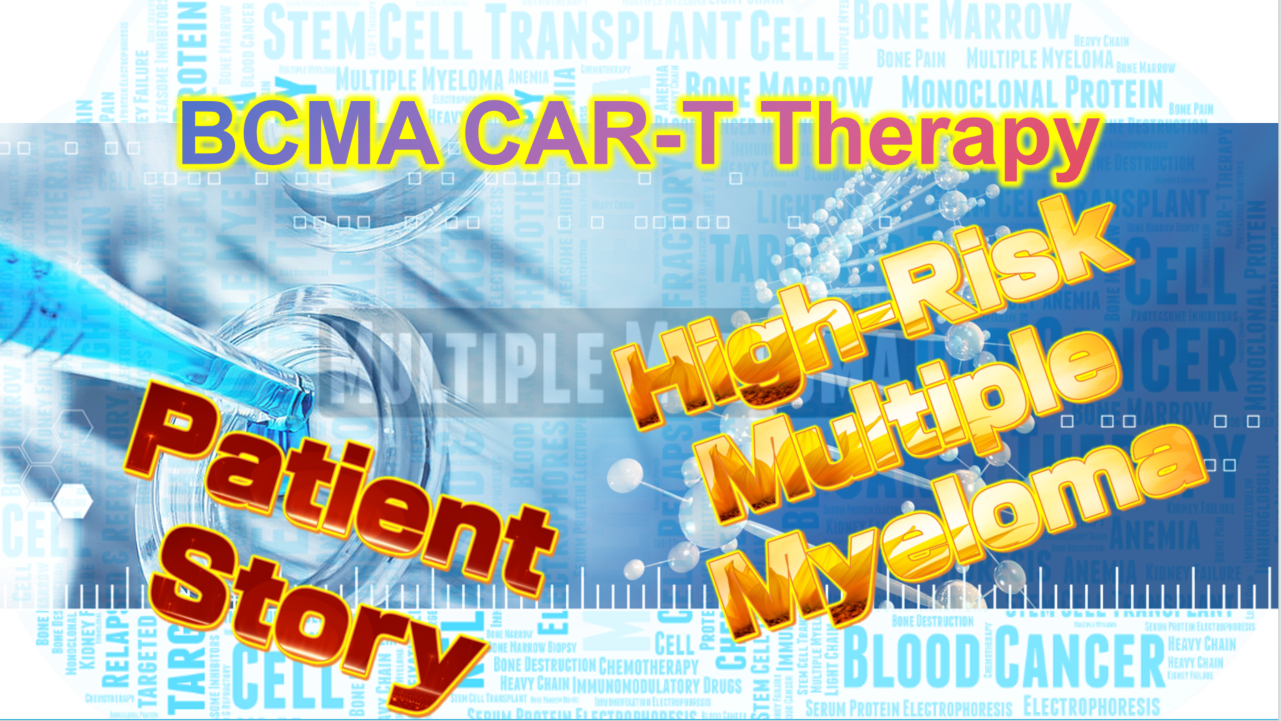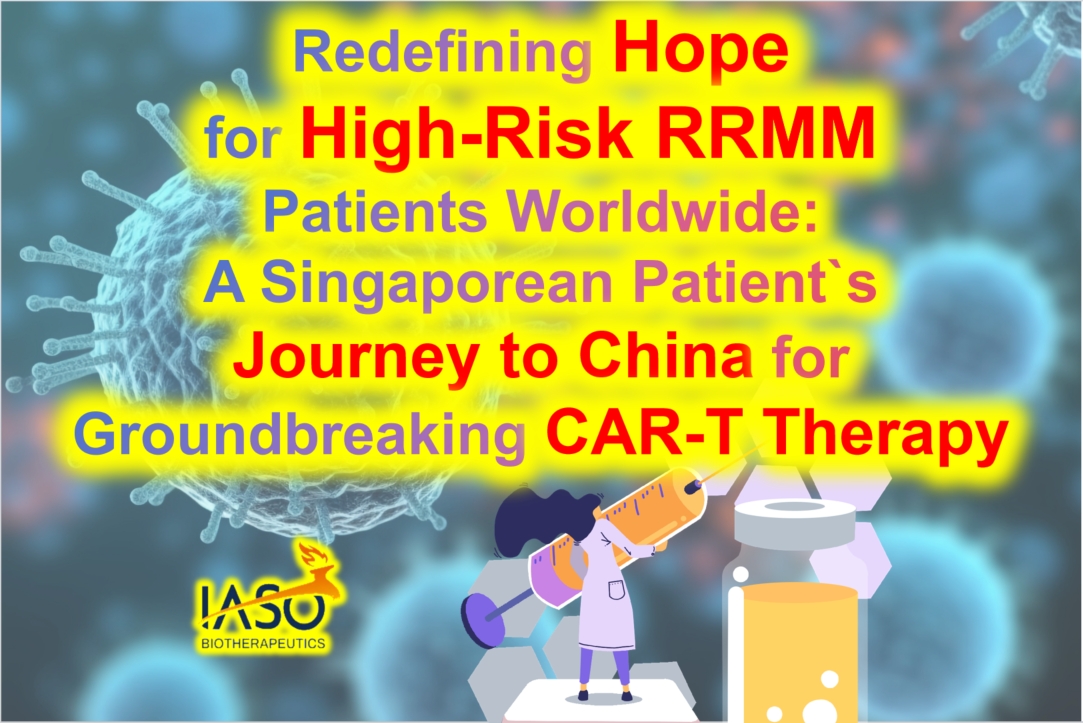Warning: Trying to access array offset on value of type bool in /www/wwwroot/www.medtourcn.com/wp-content/themes/medical-directory/framework/theme/medicaldirectory-image.php on line 78
Warning: Trying to access array offset on value of type bool in /www/wwwroot/www.medtourcn.com/wp-content/themes/medical-directory/framework/theme/medicaldirectory-image.php on line 79

A 62-Year-Old Leukemia Patient in China Receives CAR-T Therapy, Discharged After One Month, and Still Healthy After Five Years!
A 62-Year-Old Leukemia Patient in China Receives CAR-T Therapy, Discharged After One Month, and Still Healthy After Five Years!

Patient Story
#Leukemia #CAR_Therapy #CancerSurvivor #ChineseHealthcare#PatientStory
Acute lymphoblastic leukemia (ALL) is a type of leukemia that originates from B or T lymphoid progenitor cells. Leukemia cells proliferate abnormally in the bone marrow, suppressing normal hematopoiesis, leading to anemia, thrombocytopenia, and neutropenia.
Patient Story:
In 2019, 62-year-old Mr. Ke from China sought treatment at multiple hospitals due to weakness and fatigue, but no diagnosis was made. After being transferred to the hematology department and undergoing a bone marrow biopsy, he was finally diagnosed with acute lymphoblastic leukemia (ALL). Despite undergoing numerous chemotherapy sessions, his condition worsened, and his health deteriorated further.
In this challenging situation, with the help of the Advanced Medicine In China team, Mr. Ke transferred to a renowned hospital in Guangdong, China, to try the advanced CAR-T cell therapy. This was a bold decision after two years of failed chemotherapy attempts.
CAR-T Therapy: A New Hope for Leukemia Treatment
CAR-T cell therapy is a groundbreaking treatment that modifies a patient’s T cells to recognize and attack cancer cells. In early 2019, Mr. Ke received CD19 CAR-T therapy combined with a tumor DC vaccine. His T cells were reprogrammed and reinfused to fight leukemia cells.
The treatment process wasn’t easy. Although initially planned for discharge within days, he experienced high fever and lung infections during hospitalization. However, with timely intervention from the Chinese medical team, these complications were effectively managed. Eventually, Mr. Ke was discharged, and follow-up tests confirmed his complete remission.
Surpassing Traditional Therapies and Embracing a New Life
For ALL, chemotherapy is more effective in children, but its efficacy is often limited in adults, especially high-risk patients. Mr. Ke recalls, “After countless failed chemotherapy sessions, I was almost hopeless. Fortunately, CAR-T therapy worked like a miracle.”
Today, five years later, Mr. Ke remains in good health, fully recovered. Chinese hematology experts noted, “For patients who receive early CAR-T treatment, the five-year survival rate now exceeds 70%. We hope that more patients can benefit from this advanced therapy, regain their health, and enjoy life again.”
China’s advancements in CAR-T cell therapy have garnered global attention, with many international patients seeking this cutting-edge treatment. Mr. Ke’s recovery story brings hope to countless patients and highlights China’s innovative achievements in immunotherapy.
🎉🎉To assess whether the condition is suitable for CAR-T therapy, you can submit pathology reports, treatment history, and discharge summaries to the Medical Department of <Advanced Medicine in China> for preliminary evaluation!
WhatsApp: Https://wa.me/+8613717959070
Email: doctor.huang@globecancer.com
#CancerTreatment #Immunotherapy #MedicalBreakthrough #AdvancedMedicine #HealthRecovery
Warning: Trying to access array offset on value of type bool in /www/wwwroot/www.medtourcn.com/wp-content/themes/medical-directory/framework/theme/medicaldirectory-image.php on line 78
Warning: Trying to access array offset on value of type bool in /www/wwwroot/www.medtourcn.com/wp-content/themes/medical-directory/framework/theme/medicaldirectory-image.php on line 79

Blood Cancer – Diagnosis and Treatment Tips
 Blood Cancer – Diagnosis and Treatment Tips
Blood Cancer – Diagnosis and Treatment Tips 

Blood Cancer
Blood cancer, encompassing types such as leukemia, lymphoma, and multiple myeloma, represents a significant health challenge in regions like Southeast Asia and India. These hematologic malignancies arise from blood-forming cells and can impact the bone marrow, blood, and various organs. The increasing prevalence of these diseases is concerning, yet advancements in diagnosis and treatment provide hope for patients.
## Understanding Hematologic Malignancies
 Hematologic malignancies include a variety of cancers such as:
Hematologic malignancies include a variety of cancers such as:
– **Leukemia**: Cancer of the bone marrow that leads to the overproduction of abnormal white blood cells.
– **Lymphoma**: Affects the lymphatic system and includes #Hodgkin and #nonHodgkinlymphoma.
– **Multiple Myeloma**: Cancer that forms in plasma cells, affecting the production of antibodies.
 The causes of these conditions are multifactorial, involving genetic factors, immune dysfunction, exposure to environmental toxins, and lifestyle choices. For instance, a diet high in processed foods, sedentary behavior, and high stress levels can contribute to an increased risk of developing these cancers.
The causes of these conditions are multifactorial, involving genetic factors, immune dysfunction, exposure to environmental toxins, and lifestyle choices. For instance, a diet high in processed foods, sedentary behavior, and high stress levels can contribute to an increased risk of developing these cancers.
## The Rising Incidence of Blood Cancer
The incidence of blood cancers is on the rise globally, particularly in countries with aging populations. In Southeast Asia and India, there has been a noticeable increase in cases of leukemia and lymphoma, necessitating better awareness and improved healthcare infrastructure.
## Diagnosis: Early Detection is Key
Early diagnosis is crucial for successful treatment outcomes. Patients experiencing symptoms such as unexplained fatigue, frequent infections, easy bruising, or swollen lymph nodes should seek medical advice promptly. Healthcare providers may utilize blood tests, bone marrow biopsies, and imaging studies to diagnose these conditions accurately.
## Treatment Advances: A Diverse Approach
Recent years have seen significant advancements in the treatment of hematologic malignancies, offering patients more options than ever before:
1. **Combination Chemotherapy**: Despite potential side effects, combination chemotherapy remains a cornerstone treatment. New regimens are being developed that combine traditional cytotoxic drugs with targeted therapies and immunotherapies to enhance efficacy and reduce toxicity.
2. **Targeted Therapies**: Drugs that specifically target cancer cell mutations or characteristics are revolutionizing treatment. For example, *Gleevec*, the first targeted therapy, has dramatically improved survival rates for chronic myeloid leukemia (#CML).
3. **Monoclonal Antibodies**: Often dubbed “biological missiles,” these treatments target specific proteins on cancer cells, allowing for more precise treatment with fewer side effects.
4. **Hematopoietic Stem Cell Transplantation**: This procedure remains one of the most effective treatments for certain types of blood cancer, especially when other treatments fail.
5. **Immunotherapy**: This approach harnesses the body’s immune system to fight cancer. Techniques like CAR-T cell therapy, which modifies a patient’s T cells to attack cancer cells, have shown promising results in treating various hematologic malignancies. China is at the forefront of CAR-T cell therapy research and application, particularly in treating hematologic malignancies. CAR-T therapy involves extracting a patient’s T cells, modifying them to specifically recognize and attack cancer cells. Clinical research and applications in China have shown remarkable effectiveness in treating leukemia, lymphomas, and multiple myeloma. Some studies indicate that patients receiving CAR-T treatment experience significantly higher long-term survival rates and lower recurrence rates. Furthermore, China has made significant progress in the standardization of CAR-T therapy, personalized treatment plans, and the development of technological platforms, enabling more patients to benefit from this innovative treatment.
## Hope for the Future
Countries like India and those in Southeast Asia are rapidly advancing in the field of blood cancer treatment. Collaborative efforts among healthcare professionals, research institutions, and patient advocacy groups are crucial for improving access to cutting-edge therapies. The development of treatment guidelines tailored to the regional context can ensure that patients receive the best possible care.
### Conclusion
Hematologic malignancies are challenging but treatable diseases. Through early diagnosis and the application of innovative therapies, patients can achieve significant improvements in their health and quality of life. As research continues to evolve, the prospect of long-term survival and even cures for blood cancers is becoming increasingly attainable. Empowering patients with knowledge and access to modern treatments is essential to fighting blood cancer effectively in #SoutheastAsia and #India.

 To assess whether the condition is suitable for clinic therapy, you can submit Advanced Medicine in China for preliminary evaluation!
To assess whether the condition is suitable for clinic therapy, you can submit Advanced Medicine in China for preliminary evaluation!
WhatsApp: +8613717959070
Email: doctor.huang@globecancer.com
#HematologicMalignancies #LeukemiaAwareness #LymphomaResearch #MultipleMyeloma #BloodCancer #CancerResearch #CAR_Therapy #StemCellTransplant #Immunotherapy #TargetedTherapy #MonoclonalAntibodies #CancerTreatment #MedicalAdvancements #CancerSurvivor #HealthcareInnovation #ALL #AML
Warning: Trying to access array offset on value of type bool in /www/wwwroot/www.medtourcn.com/wp-content/themes/medical-directory/framework/theme/medicaldirectory-image.php on line 78
Warning: Trying to access array offset on value of type bool in /www/wwwroot/www.medtourcn.com/wp-content/themes/medical-directory/framework/theme/medicaldirectory-image.php on line 79

BCMA CAR-T Therapy Paves New Path for Treating High-Risk Multiple Myeloma
**BCMA CAR-T Therapy Paves New Path for Treating High-Risk Multiple Myeloma**

Multiple Myeloma
Multiple Myeloma (MM) is a malignant tumor originating from plasma cells, known for its complex biology and treatment resistance, presenting significant challenges to patients’ survival. For high-risk MM, especially in cases of relapse and refractory disease after multiple lines of therapy, treatment options become critically important. Recently, a team led by Professor Qian from a Chinese Hospital successfully treated a high-risk relapsed/refractory MM (RRMM) patient using BCMA CAR-T cell therapy, offering new hope for difficult-to-treat cases.
**Patient Overview**
The patient, a 56-year-old woman, initially sought treatment for persistent anemia and back pain. Baseline examinations revealed significant abnormalities, including a hemoglobin level of 67g/L, thrombocytopenia, and abnormal bone marrow findings. She was diagnosed with IgG-kappa type MM at stage ISS III/R-ISS III, with cytogenetic abnormalities and high-risk factors such as t(14;16) and 1q21 amplification. The disease rapidly progressed despite multiple lines of therapy, including VRd and DVD regimens, with external manifestations of extramedullary disease (EMD), indicating a poor prognosis.
**Treatment Journey**
The patient initially underwent VRd induction therapy, followed by DVD treatment when the disease progressed. Despite efforts, she developed multiple extramedullary lesions, leading to the use of the Dara+DECP regimen and autologous stem cell transplantation (ASCT). While these treatments provided partial remission, the disease relapsed within months, with extramedullary involvement further complicating the prognosis.
Given the poor prognosis and lack of effective treatments for EMD in MM, the decision was made to pursue BCMA CAR-T cell therapy, specifically with **Equecabtagene Autoleucel**, China’s first CAR-T product for treating MM. This therapy has demonstrated an impressive overall response rate (ORR) of 100% in patients with extramedullary disease, with a complete remission (CR) rate of 78.6%.
**CAR-T Therapy and Outcomes**
Following preconditioning with FC regimen, the patient underwent BCMA CAR-T therapy. After CAR-T infusion, the patient experienced mild cytokine release syndrome (CRS), which was successfully managed with supportive care. Over the course of three months, significant clinical improvements were observed. PET-CT scans showed no residual disease, and bone marrow biopsies were negative for clonal plasma cells. The patient achieved stringent complete remission (sCR).
Eight months after CAR-T therapy, follow-up results continue to show no evidence of disease, with the patient maintaining CR. This case highlights the long-lasting anti-tumor effects of Equecabtagene Autoleucel, a fully human BCMA CAR-T product, which offers low immunogenicity and sustained CAR-T cell persistence in vivo.
**Implications for Future Treatment**
This success story offers new hope for patients with high-risk and refractory MM, especially those with extramedullary involvement. It also provides valuable clinical insights into the use of BCMA CAR-T therapy as a promising treatment strategy. The case demonstrates that for patients with high-risk MM, comprehensive risk assessment considering genetic characteristics, treatment responses, and future treatment plans is essential for personalized care.
In conclusion, the application of Equecabtagene Autoleucel CAR-T therapy represents a significant breakthrough in the treatment of high-risk, refractory MM, particularly in cases involving extramedullary disease. This innovative approach not only extends survival but also enhances the quality of life for patients who have exhausted other treatment options, marking a new chapter in the fight against multiple myeloma.
🎉🎉To assess whether the condition is suitable for clinic therapy, you can submit Advanced Medicine in China for preliminary evaluation!
WhatsApp: +8613717959070
Https://wa.me/+8613717959070
Email: doctor.huang@globecancer.com
#MultipleMyeloma #CAR_Therapy #BCMA #CancerTreatment #InnovativeMedicine #Immunotherapy #ExtramedullaryDisease #RelapsedMM #ChinaHealthcare #GlobalHealth
Warning: Trying to access array offset on value of type bool in /www/wwwroot/www.medtourcn.com/wp-content/themes/medical-directory/framework/theme/medicaldirectory-image.php on line 78
Warning: Trying to access array offset on value of type bool in /www/wwwroot/www.medtourcn.com/wp-content/themes/medical-directory/framework/theme/medicaldirectory-image.php on line 79

Redefining Hope for High-Risk RRMM Patients Worldwide: A Singaporean Patient`s Journey to China for Groundbreaking CAR-T Therapy
Redefining Hope for High-Risk RRMM Patients Worldwide: A Singaporean Patient`s Journey to China for Groundbreaking CAR-T Therapy

Multiple Myeloma
